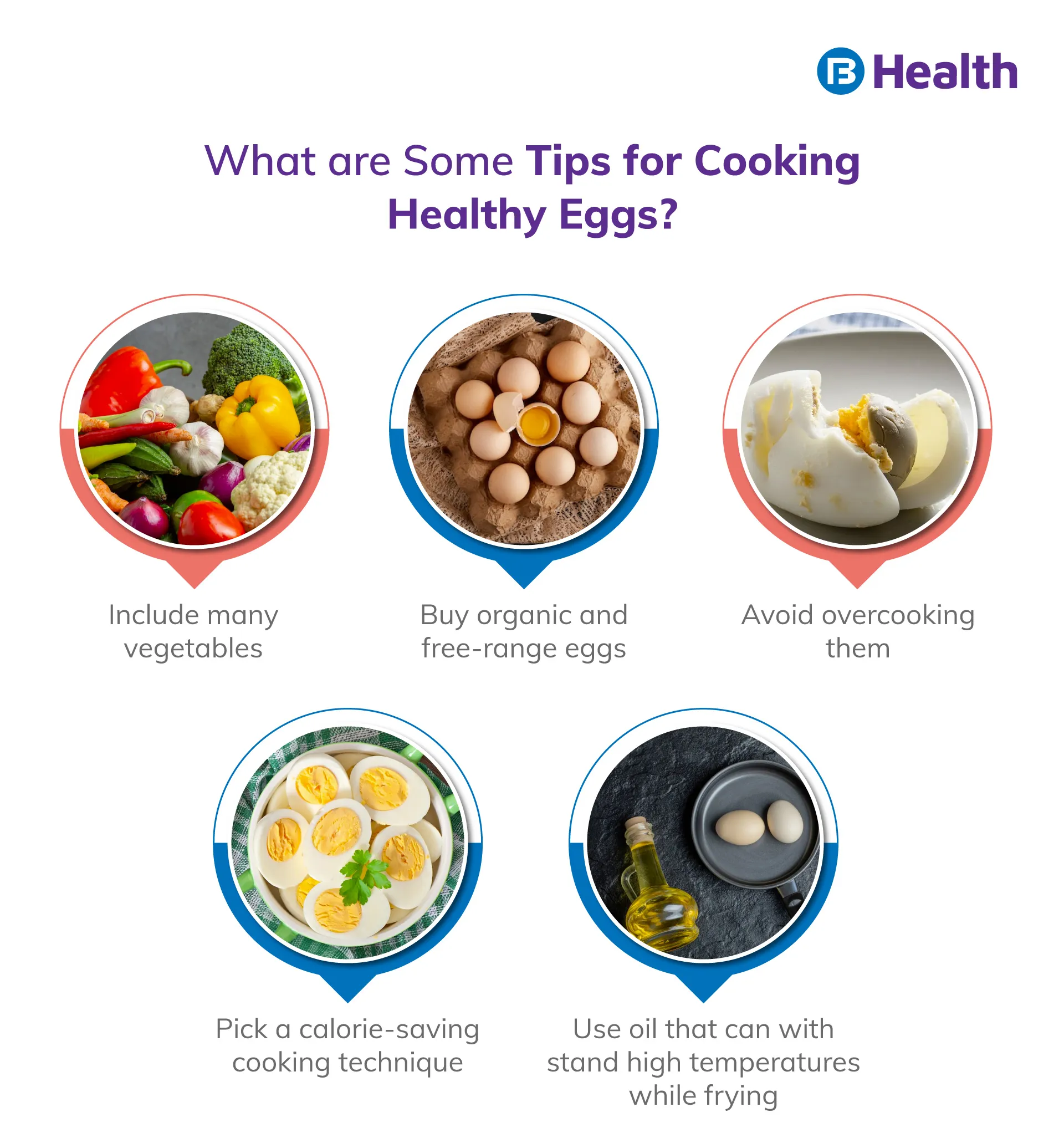Nutrition | 7 min read
World Egg Day: What are the Healthiest Ways to Cook Eggs?
Medically reviewed by
Table of Content
Synopsis
World Egg Day is joyfully celebrated every year on the second Friday of October. The entire world honours the distinctive contribution that eggs provide to sustaining people all around the globe.
Key Takeaways
- World Egg Day is observed to increase awareness for the benefits of eggs
- Nutrients in eggs can be ingested as part of a balanced diet to support optimal performance and prevent health problems
- Choline helps brain growth and function, while vitamin A supports the immune system, skin, and bone health
World Egg Day 2022 is celebrated on 14th October 2022 [1], just two days before World Food Day. The theme of this year's World Egg Day, 'Eggs for a better life,' honors the excellent capability of eggs to promote both individual health outcomes, global health, and peoples' way of life. With 13 distinct vital nutrients packed into one delicious, inexpensive package, the egg is a protein powerhouse. The egg has a wealth of nutritional advantages and is also one of the most economical and ecologically friendly animal sources of protein, supporting both families and the earth globally.
Which methods of eating eggs are the healthiest? It depends on your food, how you prepare it, and what you combine it with. They are highly nutritious if you boil eggs thoroughly enough to remove bacteria without overcooking them and destroying vital nutrients. It's crucial to use oil with a high smoke point while frying them. One of the best options is to use organic, pasture-raised eggs and lots of vegetables. On World Egg Day we have compiled a list of ways in which you can cook eggs at home in a healthy fashion:
Healthiest Ways to Cook Eggs
Additional Read: Dairy Foods That Dietitians RecommendedScrambled Eggs
Whipping eggs in a bowl is the sound of breakfast. Fat is usually necessary to keep the eggs from getting stuck to the pan during this Cooking. You can use cooking spray, oil, or butter (a nonstick pan helps too). In certain recipes, the egg mixture is mixed with milk, half-and-half, or even cream, adding more fat and calories. It is not required to add any milk, you can add a few drops of water as well, and it does not add up to your calorie count. A teaspoon of butter has roughly 35 calories and 4 grams of fat, whereas a teaspoon of oil has 40 calories and 4.5 grams of fat. Each tablespoon of heavy cream has 5.5 grams of fat and 50 calories. Therefore, a single scrambled egg with one or more extra ingredients may have at least 110 calories.

Boiled Eggs
Eggs may be cooked in their shells without breaking them. A longer cook time produces a perfectly hard yolk frequently served cold, whereas soft-cooked eggs provide a soft and runny yolk. Eggs contain all the calories when they are boiled because no additional cooking fat is required. Hard-boiled eggs are an easy, portable snack or a great source of protein for salads, while soft-boiled eggs are great for a filling breakfast.
Poached Eggs
Poached eggs are boiled eggs removed from the shell. If you carefully pour a cracked egg into a pot of boiling water, it should finish with a nest-shaped pouch of softly cooked egg white around the warm, gooey yolk (hopefully). An excellent complement to grain bowls, this method of preparing eggs doesn't call for any fat.
Fried Eggs
Fried eggs are far healthier than they appear. Eggs are broken into the pan and cooked rather than scrambled into a single uniform mixture. Then, they can be fried 'sunny-side up' or turned over and cooked on the other side until the desired doneness is achieved; therefore, the words' over easy' for a runny yolk and 'over hard' for a yolk that has been cooked more fully. Like scrambled eggs, adding butter or oil is preferred in this situation, especially if you want the yolk to stay whole.
Baked Eggs
Baked eggs are a simple and incredibly wholesome recipe. They are pretty flexible. You can serve them with the garnishes or ingredients of your choosing. Preheat your oven to 350°F before baking eggs. A nonstick pan is recommended, but you may add a little cooking spray made of coconut oil if necessary. Add an egg or eggs to a muffin pan. Bake the egg(s) for 14 - 18 minutes until the yolks are done to your preference and the whites are thoroughly cooked.

Egg Omelette
A variety of toppings, veggies, and spices may be added to omelets for a quick and easy way to eat your eggs. This recipe replaces the cheese with fresh vegetables like peppers, onions, mushrooms, spinach, and tomatoes, as well as spices like black pepper, red pepper flakes, or turmeric for some colour and an antioxidant boost. You may increase its nutritional content as per preference.
Raw Eggs
Eating eggs raw may be the best option because cooking them can sometimes remove some of the nutrients from the yolk. Eating raw eggs, however, has several significant drawbacks. They include a protein that can cause a biotin shortage, other health issues, and the risk of exposing you to Salmonella.
How does Cooking Affect the Nutrient Quality of Eggs?
The effect of cooking eggs on protein: The protein in cooked eggs is more easily absorbed. According to studies, the human body can use 91% of the protein in cooked eggs instead of only 51% in raw eggs [2]. This is because the protein in uncooked eggs exists in separate complex structures. But when you cook eggs, you break down the bonds keeping them separate. The proteins then bond together in less complex clusters that are easier for your body to digest. Cooking eggs also releases biotin from the protein avidin in egg whites, making it easier to absorb.
The effects of cooking eggs on antioxidants: cooking eggs can drastically reduce the amounts of antioxidants present in eggs. According to research on the impact of heating eggs on antioxidants, different antioxidants were lowered by half when eggs were boiled, fried, or microwaved.
Additional Read: Protein Rich Foods BenefitTips for Cooking Healthy and Nutritious Eggs
Eggs may be as nutrient-rich as you want them to be. Some general recommendations for preparing healthy and wholesome eggs this World Egg Day:
- Pick a calorie: saving cooking technique: The greatest option if you're attempting to reduce your calorie intake is to choose a boiled or poached egg. This is because the cooking processes don't require extra ingredients or oils.
- Include many vegetables: Eggs are a universal food, but they go incredibly well with vegetables. Don't hold back when adding ingredients to an omelette; add some vegetables without any hesitation.
- Use oil that can withstand high temperatures while frying: Utilizing oil that can handle higher heat is beneficial if fried eggs are more your style. Avocado oil and sunflower oil are a couple of examples.
- Purchase more wholesome, healthy eggs: The environment in which the chicken was grown and its food, among other things, might affect the quality of an egg. By consuming organic and free-range eggs, you will be improving the quality of your meals significantly.
- Avoid overcooking them: An egg's nutrients can be harmed by overcooking, especially if it is done at a high temperature. Cooking eggs can diminish the antioxidants they contain while reducing their vitamin A content by about 17%- 20%. Compared to 18% when fried or boiled for a shorter time, eggs baked for 40 minutes may lose up to 61% of their vitamin D. You can always count on eating eggs in a pleasant and nourishing way, no matter how you choose to consume them.
Cooking techniques use less heat, less cholesterol oxidation, and preserve most of an egg's nutritional value. Due to this, poached eggs or eggs cooked (either hard or soft) may be the healthiest to consume. Most importantly, these techniques for Cooking do not add any extra calories. Eating eggs is typically quite nutritious, regardless of how you prepare them. Therefore, you might want to prepare and consume them in the manner that you find most enjoyable and not worry too much about the specifics.
For more information and help, feel free to visit Bajaj Finserv Health to speak to a dietician. You can schedule a virtual teleconsultation right from the comfort of your home to receive the right advice concerning diet practices and living a healthy life.
References
- https://nationaltoday.com/world-egg-day/#:~:text=World%20Egg%20Day%20is%20held,to%20help%20feed%20the%20world.
- https://lifesum.com/nutrition-explained/whats-the-deal-with-eating-raw-eggs
Disclaimer
Please note that this article is solely meant for informational purposes and Bajaj Finserv Health Limited (“BFHL”) does not shoulder any responsibility of the views/advice/information expressed/given by the writer/reviewer/originator. This article should not be considered as a substitute for any medical advice, diagnosis or treatment. Always consult with your trusted physician/qualified healthcare professional to evaluate your medical condition. The above article has been reviewed by a qualified doctor and BFHL is not responsible for any damages for any information or services provided by any third party.





